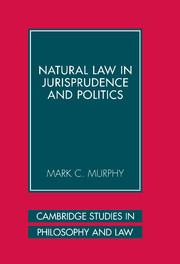Book contents
- Frontmatter
- Contents
- Acknowledgments
- Natural Law in Jurisprudence and Politics
- Introduction: Natural Law Jurisprudence and Natural Law Political Philosophy
- 1 Natural Law Jurisprudence Formulated
- 2 Natural Law Jurisprudence Defended
- 3 The Common Good
- 4 The Natural Law Rejection of Consent Theory
- 5 A Consent Theory of the Authority of Law
- 6 The Authority of Law and Legal Punishment
- 7 Beneath and Beyond the Common Good
- Works Cited
- Index
6 - The Authority of Law and Legal Punishment
Published online by Cambridge University Press: 10 March 2010
- Frontmatter
- Contents
- Acknowledgments
- Natural Law in Jurisprudence and Politics
- Introduction: Natural Law Jurisprudence and Natural Law Political Philosophy
- 1 Natural Law Jurisprudence Formulated
- 2 Natural Law Jurisprudence Defended
- 3 The Common Good
- 4 The Natural Law Rejection of Consent Theory
- 5 A Consent Theory of the Authority of Law
- 6 The Authority of Law and Legal Punishment
- 7 Beneath and Beyond the Common Good
- Works Cited
- Index
Summary
The Place of Punishment within a Natural Law Account of Politics
There is no doubt that a great deal of ordinary thought about law involves thought about punishment. But one might think, for more than one reason, that the place of a theory of punishment is bound to be at the periphery of a natural law account of political matters.
First, recall that the central thesis of a natural law political theory is that the authority of law derives from its privileged place with respect to the common good (0.1). Natural law political philosophy is concerned with law's authority. Punishment, by contrast, is concerned with law not as authoritative but with law as coercive: punishment involves the wielding of force against the unwilling to bring about certain desirable actions or outcomes. But bearing authority and having the right to coerce are two fundamentally different conditions, and neither entails the other. Needing the direction of a personal trainer, I might promise to follow your directions with respect to my exercise regimen. While that promise establishes you as an authority over me – at least in this limited domain – it does not of itself give you a right to coerce me if I fail to comply. Nor does a right to coerce entail authority. Needing help in stopping smoking, I might grant you a right to knock a cigarette from my hand if you ever see me lighting up.
- Type
- Chapter
- Information
- Natural Law in Jurisprudence and Politics , pp. 133 - 167Publisher: Cambridge University PressPrint publication year: 2006



